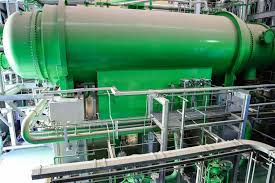Introduction
Maximizing energy efficiency in industrial refrigeration systems is crucial for reducing operational costs and minimizing environmental impact. As industries become more aware of the rising energy costs and the increasing need for sustainability, optimizing refrigeration systems has emerged as a top priority. From reducing electricity consumption to ensuring better heat exchange and minimizing refrigerant use, there are numerous ways in which industrial refrigeration systems can be fine-tuned for greater efficiency. This blog explores the strategies, technologies, and best practices that industries can implement to enhance the energy efficiency of their refrigeration systems, resulting in both economic and environmental benefits.
Energy Efficiency and Reduced Carbon Emissions:
- Condensers help improve the overall efficiency of industrial cooling systems by facilitating the exchange of heat from refrigerants to the environment. By enabling systems to operate at optimal temperatures, condensers reduce the energy required for cooling processes, leading to a decrease in the consumption of electricity generated from fossil fuels. The reduction in energy consumption directly contributes to a decrease in carbon dioxide (CO2) emissions, making condensers a key factor in reducing the carbon footprint of industrial operations.
Lower GWP (Global Warming Potential) Refrigerants:
- Modern condensers are often designed to work with low Global Warming Potential (GWP) refrigerants, such as hydrofluoroolefins (HFOs) or natural refrigerants like ammonia, CO2, or hydrocarbons. These refrigerants have a significantly lower environmental impact compared to traditional refrigerants, which are potent greenhouse gases (GHGs). By adopting advanced condenser designs compatible with these low-GWP alternatives, industries can substantially reduce the emissions associated with cooling systems.
Heat Recovery Systems:
- Many industrial cooling systems use condensers in conjunction with heat recovery systems. Condensers can capture and repurpose waste heat from cooling processes to preheat water or air for other processes in the facility. This approach reduces the need for additional heating systems, lowering overall energy consumption and emissions. By recovering and reusing waste heat, industries reduce reliance on external energy sources and minimize the need for burning fossil fuels, which are the primary sources of CO2 emissions.
Enhanced Condensing Technology:
- The development of high-efficiency condensers, such as air-cooled or evaporative condensers, contributes to more sustainable cooling operations. These technologies are designed to optimize heat transfer and reduce the amount of energy required for the condensation process. Air-cooled condensers, for example, reduce water usage and avoid water discharge, while evaporative condensers offer a more energy-efficient way to cool industrial systems compared to traditional water-cooled models. Both solutions help reduce the emissions associated with energy-intensive cooling operations.
Reducing Water Usage and Environmental Impact:
- Industrial cooling systems, particularly those using water-cooled condensers, often consume large amounts of water, which can have significant environmental impacts, especially in water-scarce regions. Condensers that use air cooling or closed-loop systems reduce the need for large-scale water consumption, helping to conserve this precious resource. This reduction in water usage also indirectly reduces emissions related to water treatment and distribution, as well as the energy used in pumping water for cooling.
Regulatory Compliance:
- Many industries face increasingly stringent regulations aimed at reducing emissions and improving energy efficiency. Condensers that utilize advanced technologies not only help industries comply with environmental standards but also improve their reputation by demonstrating a commitment to sustainability. By adopting cleaner cooling technologies and efficient condenser systems, industrial facilities can meet both national and international regulations related to emissions, water use, and energy efficiency.
“Maximizing Energy Efficiency in Industrial Refrigeration Systems”
Explore how industries can optimize refrigeration systems for better energy performance, focusing on advanced technologies, insulation materials, and system upgrades that reduce energy consumption and environmental impact.
“The Impact of Cooling Tower Technology on Industrial Sustainability”
Discuss the latest advancements in cooling tower design and technology, focusing on their role in improving energy efficiency, reducing water usage, and supporting sustainable industrial operations.
“Innovations in Heat Exchanger Design for High-Performance Cooling”
Analyze the newest innovations in heat exchanger technology, from compact designs to materials with enhanced thermal conductivity, and how they are improving cooling efficiency in various sectors like power plants, manufacturing, and HVAC.
“The Role of Closed-Loop Systems in Reducing Environmental Impact”
Examine the benefits of closed-loop cooling systems, including how they help conserve water, reduce chemical usage, and contribute to lower emissions and improved energy efficiency in industrial processes.
“Preventative Maintenance for Industrial Chillers: Best Practices and Cost Savings”
Highlight the importance of regular maintenance for industrial chillers, including best practices to extend their lifespan, avoid costly repairs, and improve system efficiency, with a focus on preventive measures.
Conclusion
In conclusion, improving energy efficiency in industrial refrigeration systems is not only a smart business move but also an essential step toward more sustainable industrial practices. By adopting modern technologies, performing regular maintenance, optimizing system designs, and integrating energy-efficient components, companies can achieve significant reductions in energy consumption, lower operational costs, and contribute to their environmental goals. As industries continue to prioritize sustainability, enhancing the energy efficiency of refrigeration systems will remain a key factor in driving both economic performance and environmental responsibility.

